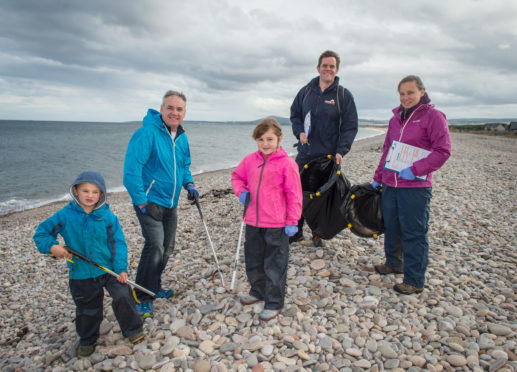Volunteers braved the rain and harsh winds to help clear litter from a Moray beach as part of a national campaign.
The annual Great British Beach Clean sees people from all over the country venture to the seaside and pick up discarded plastic and waste.
Yesterday, volunteers gathered at Spey Bay to clear rubbish such as cigarette butts and drinks cans from the beach.
They were also tasked with recording what kind of litter they were collecting, so that the Marine Conservation Society (MCS), who organise the clean-ups, can find out where it is all coming from.
This research can then be used as the catalyst for changing recycling laws, such as the plastic bag charge and the upcoming ban on plastic-stemmed cotton buds.
Calum Duncan, Head of Conservation Scotland for the MCS, believes that the work the volunteers do is vitally important to conserving marine and sea life.
He said: “This project is more than a clean-up, its about getting information. So basically what we do is we count all of the rubbish on a 100m stretch of beach and that helps us tell where the rubbish is coming from.
“The phrase we call this is citizen’s science and the data we have collected on this project over the years, we’ve done it for 25 years, has helped us support things like the carrier bag charge, the commitment to a deposit return scheme for drinks containers, bottles and cans and to be introduced this year the ban on plastic stemmed cotton buds.”
With plastic being a big issue in the world’s oceans, MCS hope that any information gathered in the beach cleans can help them fix that problem.
It speculated that, by 2050, there might be more plastic in the ocean than fish.
Moray MSP Richard Lochhead was also taking part in the event and spoke about the importance of the scheme.
He said: “We are very lucky to be blessed with such a beautiful coastline in the Moray Firth and across Moray and for that reason tackling marine litter is a big priority locally.
“This annual event is a great way to highlight the fact that clearing up our seas is a global issue and ensuring that plastic doesn’t pollute our beaches or harm our marine wildlife.”
